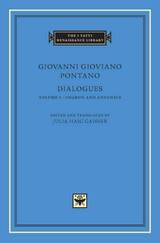

Giovanni Pontano (1426–1503), whose academic name was Gioviano, was the most important Latin poet of the fifteenth century as well as a leading statesman who served as prime minister to the Aragonese kings of Naples. His Dialogues are our best source for the humanist academy of Naples which Pontano led for several decades. They provide a vivid picture of literary life in the capital of the Aragonese seaborne empire, based in southern Italy and the Western Mediterranean. This first volume contains the two earliest of Pontano’s five dialogues. Charon, set in the underworld of classical mythology, illustrates humanist attitudes to a wide range of topics, satirizing the follies and superstitions of humanity. Antonius, a Menippean satire named for the founder of the Neapolitan Academy, Antonio Beccadelli, is set in the Portico Antoniano in downtown Naples, where the academicians commemorate and emulate their recently-deceased leader, conversing on favorite topics and stopping from time to time to interrogate passersby.
This volume contains a freshly-edited Latin text of these dialogues and the first translation of them into English.

Giovanni Gioviano Pontano (1429–1503) served five kings of Naples as a courtier, official, and diplomat, and earned even greater fame as a scholar, prose author, and poet. His Dialogues reflect his diverse interests in religion, philosophy, and literature, as well as in everyday life in fifteenth-century Naples. They are especially important for their vivid picture of the contemporary gatherings of Pontano and his friends in the humanist academy over which he presided from around 1471 until shortly before his death.
Volume 2 includes the Actius, named for one of its principal speakers, the great Neo-Latin poet Jacopo Sannazaro, and contains a perceptive treatment of poetic rhythm, the first full treatment of the Latin hexameter in the history of philology. The dialogue continues with a discussion of style and method in history writing, a landmark in the history of historiography. This is a new critical edition of the Actius and the first translation of this dialogue into English.

Giovanni Gioviano Pontano (1429–1503) served five kings of Naples as a courtier, official, and diplomat, and earned even greater fame as a scholar, prose author, and poet. His Dialogues reflect his diverse interests in religion, philosophy, and literature, as well as in everyday life in fifteenth-century Naples. They are especially important for their vivid picture of the contemporary gatherings of Pontano and his friends in the humanist academy over which he presided from around 1471 until shortly before his death.
This volume completes the I Tatti edition of Pontano’s five surviving dialogues and features both Aegidius and Asinus. The conversation in Aegidius, named for the Augustinian theologian Giles of Viterbo, ranges over various topics, including creation, dreams, free will, the immortality of the soul, the relation between heaven and earth, language, astrology, and mysticism. The Asinus is less a dialogue than a fantastical autobiographical comedy in which Pontano himself is represented as having gone mad and fallen in love with an ass. This is the first translation of these dialogues into English.

A renowned Renaissance poet’s homage to Naples makes its debut in modern English translation.
Giovanni Pontano (1429–1503), whose academic name was Gioviano, was one of the great scholar-poets of the Renaissance as well as a leading statesman who served as prime minister to the Aragonese kings of southern Italy. The dominant literary figure of quattrocento Naples, Pontano produced literary works in several genres and was the leader of the Neapolitan academy. The two works included in the present volume, broadly inspired by Virgil, might be considered Pontano’s love songs to the landscapes of Naples. The Eclogues offer a spectacular, panoramic tour of the Bay of Naples region, even as they focus on intimate domestic scenes and allegorize the people and places of the poet’s world. The Garden of the Hesperides is a work of brilliant erudition on an unprecedented poetic topic: the cultivation of citrus trees and the splendid pleasures of gardens. This volume features a newly established Latin text of the Garden of the Hesperides as well as the first published translations of both works into English.


READERS
Browse our collection.
PUBLISHERS
See BiblioVault's publisher services.
STUDENT SERVICES
Files for college accessibility offices.
UChicago Accessibility Resources
home | accessibility | search | about | contact us
BiblioVault ® 2001 - 2025
The University of Chicago Press









